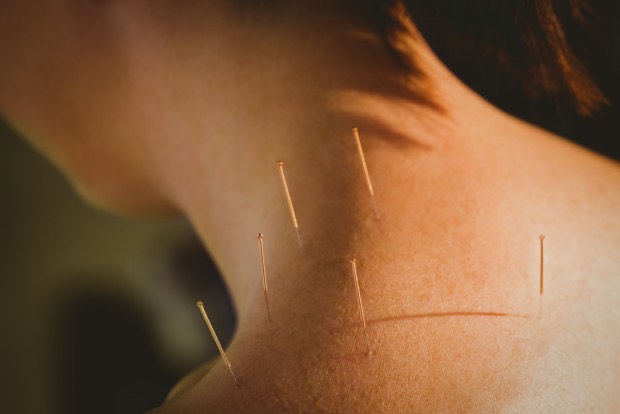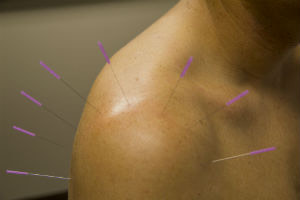Menopause and Frozen Shoulder: How the Two Might be Connected, and How Acupuncture and Cupping Can Treat Both
Frozen Shoulder: A Symptom of Menopause?
Frozen Shoulder (FS), or adhesive capsulitis, is a condition that causes pain, stiffness, and limited mobility in the shoulder joint. It can be a result of a combination of hormonal changes, injury, and prolonged shoulder immobilization, leading the connective tissues surrounding the shoulder to become thickened and inflamed. This can lead to scar tissue formation and further restriction of movement.
FS primarily affects adults, especially those between 40 and 60 years old, and it occurs more often in women than men. This has led researchers to believe there may be a hormonal link at play. The Traditional Chinese Medicine (TCM) term for “frozen shoulder” translates into English as “shoulder at the age of 50 years”.
Frozen shoulder typically progresses through three stages:
- The freezing stage: marked by increasing pain and reduced mobility.
- The frozen stage: where stiffness is most severe.
- The thawing stage: during which movement gradually improves.
Frozen shoulder can develop over months and may last up to two years if untreated.
Benefits of Acupuncture and Cupping for Frozen Shoulder
In TCM, there is an understanding that different people can have the same symptoms, but have different underlying conditions that are causing pain and other symptoms. The specific presentation of symptoms can help an acupuncturist determine the underlying root causes of the condition and treat them accordingly.
Acupuncture and cupping aims to restore your body’s energy balance, known as Qi, which flows through meridians or pathways. When Qi is blocked or unbalanced, you may experience pain and dysfunction, like in the case of FS.
Acupuncture and cupping helps to treat FS by stimulating the body’s natural healing processes by needling into specific acupuncture points. The benefits include:
- Increased Blood Flow: improving circulation around the shoulder joint, ensuring that oxygen and nutrient-rich blood reaches the affected tissues. This increased blood flow promotes healing, reduces stiffness, and accelerates recovery. Improved circulation can also reduce swelling.
- Reduced Inflammation: Reduction in inflammation decreases pressure on surrounding tissues, easing pain and allowing for greater mobility.
- Relaxation of Tight Muscles: Relaxation of muscles reduces the tension contributing to pain and stiffness while promoting a more balanced flow of energy throughout the body. Improved energy flow can enhance the body’s overall healing process. By relaxing muscles and increasing joint lubrication, acupuncture promotes a greater range of motion.
- Promotes Holistic Healing: Acupuncture not only targets physical symptoms but also supports overall well-being by addressing stress, anxiety, and fatigue associated with chronic pain.
- Cupping: Involves placing specialized glass cups on the skin to create suction. This vacuum effect lifts the skin and underlying fascia, increasing circulation and loosening tight tissue. For FS, cupping is typically applied around the joint and shoulder blade.
The number of sessions required varies, but most people see noticeable improvements after 4 to 6 sessions. For chronic or severe cases, a longer course of 8 to 12 treatments may be needed.
In some cases, individuals with complex conditions may require maintenance sessions beyond the initial course of treatment. These ongoing treatments help sustain progress, prevent symptom recurrence, and further enhance shoulder flexibility and function.
The ability to customize the treatment plan ensures that each patient receives care tailored to their unique needs, maximizing the benefits of acupuncture.
The Menopause and Frozen Shoulder “Double Hit”
There is no current evidence that directly links menopause and frozen shoulder. But it’s likely that changing hormones during menopause can put folks at risk.
Menopause is the stage of life in which people who have periods no longer have one. This occurs due to declining levels of the hormones estrogen and progesterone. Estrogen is also good for the joints, as it protects the cartilage, stimulates bone growth, and helps regulate inflammation. Low levels of estrogen cause many of the symptoms of menopause, like hot flashes and insomnia.
For many, the onset of FS during perimenopause or menopause feels like a double burden. Not only are they dealing with menopausal symptoms, but the sudden, sharp pain and reduced mobility in their shoulders make day-to-day activities even harder.
Acupuncture is exceptional at both treating hormone imbalances and reducing pain. Other symptoms of menopause that acupuncture can help with, include:
- Night sweats
- Mood changes
- Anxiety
- Fatigue
- Low back pain
Early intervention through acupuncture and physiotherapy can help maintain shoulder function and prevent the condition from progressing.
Written By: Yvonne Sui




